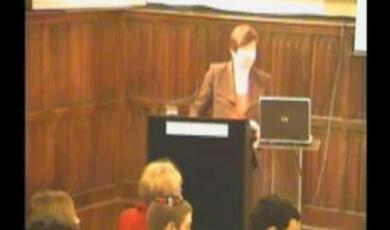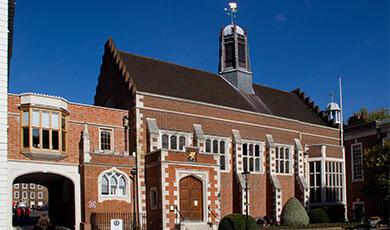Sisters, sisters, there were never such devoted sisters
Share
- Details
- Text
- Audio
- Downloads
- Extra Reading
In England, interpersonal rights and duties of support have traditionally only attached themselves to couples united by law, sex and children. Why should there not be family obligations to support siblings and parents? When a daughter has taken care of her elderly parents throughout her life, does she have rights when they die? When two sisters have lived together for decades, why are they treated less generously than civil partners when one of them dies?
Download Text
Family Relationships and the Law: Family Members
Baroness Ruth Deech of Cumnor DBE, Gresham Professor of Law
02/02/2010
I remind you of the theme that I set out at length in my first lecture and to which I wish to adhere - that there needs to be a reassertion of the place of morality in our private as well as our public politicians' lives, and especially so where there is an overlap between the two spheres. The overlap occurs where public policy issues like taxation, childcare and employment are affected by relations within the family. I want to ask why in English law we treat siblings less favourably than married or civil partners; and why we do not expect adults to maintain their parents or their grandparents in return for the keep that was extended to them in their youth. One has to wonder why English law only attaches support obligations to parents of young children and to those in a sexual relationship, while the blood relationship comes second.
There is a parallel here with the situation I have described in an earlier lecture: our government feels free, indeed obligated, to impress upon all of us, and sometimes coerce us, that we need to keep healthy by eating the right food, from children 's packed lunches to supermarket shopping; we need to preserve the environment and stop flying, driving and using plastic shopping bags; that we must exercise, protect our own health and fight obesity; that we must not smoke, drink-drive, speed, drink to excess, fail to wear seat belts and safety helmets; we must breastfeed and abandon disposable nappies; sort our rubbish correctly, build sustainably and use low energy light bulbs and so on. Sexual activities however remain taboo as a subject of control. The fact that overpopulation is the biggest scourge of the environment has not led to any encouragement to limit births; sexual activity leading to neglected and abused children brought up in dangerous homes, or abandoned wives and emotional damage remains without disapprobation. It is acceptable to comment in public on someone 's weight, smoking or failure to exercise, but never to pass any judgment on sexual activity and its results that have caused more damage than any of the activities mentioned above. On the contrary, free sexual activity receives rewards from the law in a way that caring outside such a relationship does not.
Siblings
There's an old song from the 1954 Bing Crosby movie White Christmas, sung by Rosemary Clooney, that runs like this: 'sisters, sisters, never such devoted sisters, Never had to have a chaperone, no sir, I'm here to keep my eye on her, Caring sharing Every little thing that we are wearing . . . Many men have tried to split us up but no one can, Lord help the mister who comes between me and my sister, And Lord help the sister who comes between me and my man.'
Sadly in the case I am about to describe, the caring and sharing may come to nought, and it is the Minister who has come between the sisters.
Miss Joyce and Miss Sybil Burden of Wiltshire have lived together their entire lives and are in their late 80s. They remain single. They cared for their parents and two aunts to the end and did not allow them to go into a home. Their Wiltshire house and other assets are worth about £590K each. When one of the sisters dies, the survivor, wishing to remain in her home, will have to pay in inheritance tax of 40% of the excess over the exemption limit which is currently £315K, namely about £108K each. Not having the cash in hand, this would mean having to sell the home and might render the survivor homeless. This will occur because they are not spouses or lesbians in a civil partnership, who are exempt from the inheritance tax until the second death. Every year for 32 years at Budget time the Misses Burden have written to the current Chancellor of the Exchequer to protest and ask for a change in the law, to no avail.
Their case was strengthened when the inheritance tax exemption that had once only been granted to spouses was extended to civil partners after the enactment of the Civil Partnership Act 2004. To quote the sisters in a letter to me: "We have been fighting for 32 years to gain the same rights as regards inheritance tax as married couples, and now homosexual and lesbian couples, but our appeal was completely ignored, there was not a single member of the House of Commons raised a finger to help us, the very thing we had been asking for so many years, was given to homosexuals and lesbians without a fight." This was their response to an amendment to give family members who live together the same exemptions during the passage of the Civil Partnership Act, which failed in the Commons although successful in the Lords.
The sisters have tried every legal way to reduce inheritance tax; this culminated in their appeal to the European Court of Human Rights Grand Chamber, alleging discrimination under Art.14 of the ECHR, which prohibits discrimination on the grounds of status, the right affected being Art. 1 of Protocol 1 prohibiting deprivation of property. The Grand Chamber found against them on the ground that the state was entitled to differentiate between marriage and other relationships from the perspective of tax.
This argument is a weak one, given that the clear blue line that used to exist between marriage and singlehood was blurred once the exemption was extended to gay couples. Moreover only 4% of persons actually have sufficient wealth to come into the inheritance tax bracket so an extension to family members may not have cost much, especially as it is only deferral of the total tax until the point of death of the survivor that is in issue, not absolute exemption with consequent loss to the Treasury.
The Government 's stated policy in family matters is to promote stable long term relationships, even if outside the framework of traditional marriage. To quote the Burden sisters again: "We did our duty by the previous generation, but it all counts for nothing now with this labour government, they are totally corrupt!" "Their only concern is for people living in sin, we have lived a blameless life, always paying our taxes etc." "I am terribly upset by this and I just don't know what we are going to do. We have spent our lives looking after people and never once done anything wrong. And now we are punished for doing the right thing. This government is always going out of its way to give rights to people who have done nothing to deserve them. If we were lesbians we would have all the rights in the world. But we are sisters and it seems we have no rights at all." It is too late for them to rearrange their property to avoid tax because it would have to be done at least 7 years before death, it would involve guessing which of the two would be the survivor, and in any case stamp duty of about £20K would have to be paid. As it stands half the property would be chargeable for IHT, what remained of that half would pass to the surviving sister, and her estate would have to pay IHT again on everything she left on her death, ie it seems as if tax is payable twice over.
It is an odd refusal of relief by the government, given that it should be policy to keep people housed, recognise the arrangements that people want to make for each other, and respect the elderly and their carers. Other cases, such as the daughter who looks after her father for years, but does not inherit, are similar, or if she does inherit the tax has to be paid. There is surely a case for changing the law for carer situations, even if not for siblings. The Treasury was concerned that revenue would be lost; but it is only deferral that is in issue, and the door would not be open to every two people seeking to avoid tax by living together. The sensible reform would be grant deferral of IHT to any two family members who are codependant and are within the prohibited degrees, so that the option of civil partnership or marriage is not open to them.
The extraordinary thing about our tax system is the way in which it privileges sexual relationships of any variety above all others. The Government argument was that the current IHT exemption exists to promote stable committed heterosexual and homosexual relationships. This is a weak argument when no children are involved, for there is no particular interest of the state otherwise. But given that this is the policy, the stable relationship of two sisters and their plight on the death of one is of no less interest to society. Indeed their 82 years together must put them in the top tiny percent of lasting relationships. Before the ECHR the government argued that the sibling relationship was different because it was one of consanguinity, not of choice as sexual relationships are. The relevance of this is hard to see - sexual activity itself does not cause dependency - but in any case the sisters had chosen to live together and care for each other. Their dependency was as great as any married couple and their commitment greater than most. Siblings have no rights and responsibilities in relation to each other but that is because the law gives them no framework for creating them, as we shall see shortly. The government was actually holding against the Burden sisters their inability to enter a civil partnership. Marriage has special responsibilities and rights but has lost its uniqueness in that regard. The government yielded to the gay lobby when it pressed for same sex couples to be treated in the same way as married couples, but once marital rights such as pension rights, rights to take key medical decisions and so on are extended beyond marriage, there is no good reason not to extend them still further to others in long term caring and stable relationships who happen to be related by blood.
Grandparents
Grandparents now put up a strong campaign and profile. There are many lobbying organisations for them, ranging from Age Concern to Grandparentsplus, the All party Parliamentary Group for Grandchildren, the Grandparents' Association and so on. They have been brought into being in part because of the grief of grandparents who lose contact with the grandchildren after the separation or divorce of their parents, and in part because there are so many older people in our society now. Those groups campaign for increased legal support for contact orders, reflecting the 1m grandparents who lose contact after the parents separate, that is 4/10 of those affected by their children 's divorce. They want contact with the children and they want to be appointed carers of children who would otherwise be placed with adopters or fosterers after the breakup of the parents.
Even where the family is intact, grandparents are increasingly a source of childcare because the mother is going out to work when she has dependent children, and especially when she is single she needs the help of (usually) her parents. Often the single mother 's mother is also a single woman herself, and this scenario is usually associated with poverty passing on from generation to generation. Current government policy is to encourage mothers to go back to work; hence they encourage grandparental childcare because there is insufficient affordable other childcare available, albeit that the contribution made by grandparents is not compensated financially. Grandparent carers will get National Insurance credit towards the state pension from April 2011, and there are calls for child care credits to be payable to grandparent carers.
Government policy is favourable towards the benefits of grandparents' involvement even if the law does not recognise them to the same extent. In Scotland there is an official Charter for Grandchildren, which states that they can expect to know their family history, and that courts should take into account the love and support that grandparents can offer.http://www.scotland.gov.uk/Resource/Doc/112493/0027333.pdf Grandparent contact is generally regarded as good, although there are suspicious voices that see it as a backdoor way for a father, who is estranged from his former wife and has no contact rights, to get them through his own parents. This reflects the hostilities attached to the Fathers for Justice campaigns. Cynics might also say that rights for grandparents suit the state, flagging up concern for responsible parenting after divorce, keeping fathers involved, and saving on caring and childcare facilities. Some research indicates that grandparents may not have the energy or affection for their grandchildren that they are popularly supposed to have, may be party to the feud between the parents, that there may not be enough weekends in an older child 's life for visits to both parents and grandparents. Other research finds that grandparent involvement correlates with good outcomes in education and conduct, emotional and behavioural issues (Buchanan, A. 'National Study on Involved Grandparenting and Child Well Being' ESRC 2008.) Probably relations with grandparents, good or indifferent, stay much the same before and after divorce; all are agreed that the contact should be the right of the child, not the grandparents, and that court litigation is not the way to solve the disagreements, but negotiation and mediation.
The law on this is fairly weak. Grandparents can apply for contact under s.8 of the Children Act 1989 with the leave of the court first given under s.10(9) (unless the resident parent agrees). The double process is a filter to prevent vexatious and interfering applications by relatives and other third parties. Grandparents can get leave if they meet criteria about connection with the child, harm from disrupting existing contact, and if the child is in care the plans of the local authority and the wishes of the parents have to be taken into account. The court is unlikely to make an order if it is against the wishes of the parents, who are the primary carers; enforcement is and would be difficult. Campaigners would like to remove the need to ask for leave before proceeding to the substantive action.
In a Department of Children Schools and Families publication issued on 20 January 2010, Support for all - the families and relationships Green Paperthe Government promised to do just this, and in addition to provide information for grandparents on their rights and support available
There is speculation as to how Article 8 of the Human Rights Act might affect the situation. It grants the right to respect for family life. The general attitude seems to be that the parents' family life with the child would be of more importance and that the grandparents would come second, unless the child had actually had his or her main home with the grandparents. In a legal clash between parents and grandparents the former have the upper hand.
The same attitude has been taken in the US. The leading case is Troxel vGranville, decided in 2000 by the Supreme Court. Tommie Granville and Brad Troxel were the unmarried parents of two daughters. When their relationship ended, Brad often took the children to see his parents. He committed suicide two years later but the children stayed in touch with the grandparents until Tommie married someone else, and wanted to stop the grandparents' visits. The grandparents relied on a statute of Washington State which granted third parties the right to file for visitation. The Washington court ruled the statute void for constitutional reasons. Then the case went to the Supreme Court, which agreed. It ruled that parents should be assumed to be acting in the best interests of their children and the state should not inject itself into the private realm of the family to question the decision of the parents. Nevertheless most US states do have visitation statutes broad enough to encompass applications by grandparents, but in practice it is granted only if visitation is in the best interests of the child, or even that the child will suffer harm if it is not allowed.
Grandparents and the elderly are a growing problem, whether giving or receiving care. By 2021 there will be more over-65s than under 16s in the UK (ONS, Social Trends 2008). There are 14m grandparents in the UK, of whom 1.5m are under 50 and 7m under 65. As the middle classes give birth at an older age, they tend to be older grandparents with more of an age gap between the generations. Working class women are more likely to become grandparents before they reach the age of 50 (21.5%) than middle class women (5.3%); and twice as likely to reach that status before they are 60 (56% v. 26.4%). Working class grandparents are more likely to belong to 4-generation families, who are amongst the poorest. Many single grandparents have children who are also single parents (38% of single grandparents.) Because of the reliance on grandparents to help out with childcare for the working mother, this places particular burdens on grandparents who may need to work themselves, but feel obliged to help out the younger generation. 1 in 100 grandchildren actually live with the grandparents.
This is all related to the poverty of the elderly. They are assuming burdens which deprive them of their own chance to continue to earn a living, and for which they are not compensated, and the childcare they give is no doubt at some cost to them. The single grandparent of the children of a single mother is in a particularly difficult financial position. In this way the disruption caused by divorce or separation spreads its ripples through the generations, the hardship experienced by the single mother affecting her extended family if they help out. There is a dearth of affordable childcare and an attempt to meet it by conscripting grandmothers.
82% of children receive some care from their grandparents. 5m grandparents spend 3 days a week caring for them. One-third of families depend on the grandparents for childcare (ONS Social Trends April 2009). The mother is more likely to work if her mother is alive to help out. 47% of single parents depend on grandparents for care and the value of care given by grandparents has been valued at £3.9bill. Grandparents are the support of the future of their grandchildren. 31% of them save to help with the future house purchase by their grandchildren, and no doubt for their higher education. 70% of them give financial support to the grandchildren and £470m pa is contributed to their trust funds. £4bill of legacies skips a generation and goes straight to the grandchildren.
The situation may worsen. There will soon be fewer earners to support the growing retired population (World Bank, Averting the Old Age Crisis). 20% of pensioners are below the poverty line; 1/6 claim to be lonely; 1m spent Xmas day 2004 alone; 4/10 of those admitted to hospital are malnourished and 6/10 of those become even more malnourished while they are there. Older people are being encouraged to work, and there is new legislation giving some protection against ageism (Employment Equality (Age) Regulations 2006; Equality Bill 2010). But a mandatory retirement age may still be justified as proportionate by the state according to the European Court of Justice Heyday case (2009), now before the High Court for further determination. However, if grandparents are burdened by childcare, they are unlikely to be able to take advantage of increased employment rights, and when unemployment is high there is still a tendency to give jobs to the younger rather than the older.
In return for all that grandparents do, should there not be an obligation to keep them, and to keep parents, and reciprocate the care that was given by them to children and grandchildren in their youth? From the time of Elizabeth I the Poor Law required the infirm and the poverty stricken to rely on their families, who were fined if the help was not forthcoming. Sons had to support their parents and grandparents throughout their lives, daughters until they married. This was only repealed in 1948 (National Assistance Act s.42 limited the duty to support of spouse and children.) It was the law in Scotland until 1985 and Holland until 1970. There are suggestions in the US that there should be a filial responsibility law and in e.g. S Dakota children have been made to pay for the medical care of their parents.
In France there is a limited duty to support members of the wider family, known as l'obligation alimentaire, if parents cannot, and with priority to one 's own spouse and children.This topic is linked with the enormous expense now incurred by older people who need residential care. They receive no state help if they have a house or savings of more than £23K and this is de facto a burden on their families either because they have to pay up or because they are deprived of an inheritance which has had to be spent on the care of the parents. Singapore has a Maintenance of Parents Act 1995, which provides that anyone over 60 who is unable to maintain themselves adequately can apply for an order that their child should do so via periodical payments or a lump sum. The Tribunal for the Maintenance of Parents may make an order if it is just and equitable to do so, having regard to all the circumstances including, for example, if the parent had dissipated his resources or had neglected or abused the child from whom he claims.
Unfortunately, tempting though it seems, the possibility of switching support of indigenous adults away from the state to their children and grandchildren is not possible now. It would be seen as an attempt to cut state expenditure; it would give rise to arguments within families about the sharing of help and resources; it might deprive older people of state benefits now available to them; and it would certainly become a burden on the women in the family, whose independence and career progression would take a setback. Many parents are in fact cared for by their children and others might feel it humiliating to have to seek a court order to that end. Broken marriages and geographical mobility mean that there are many parents who are not nearly as close to their children as they might be in better circumstances, indeed are estranged. There will be children without resources, or who have chosen careers that paid little and were not careers that their parents urged them to choose. Moreover, now that higher education equates with debt, the reality is that parents will be supporting children well into their own adulthood, and possibly taking responsibility for the debts of the children, rather than the other way round.
There are however many adult children who do care for their parents and some hard cases where an inheritance is promised but the will is not made, and when the parent dies the child is disinherited and maybe loses the home because another person is the heir. It is especially odd that a cohabitant who lives with a man and is kept by him has a claim under the Inheritance (Provision for Family and Dependants) Act 1975, while a deserving carer daughter does not because she is not, as the Act requires, being maintained by him. (Oldham, M., 'Financial Obligations within the Family', ( (2001) 60 Cambridge Law Journal 128). Thus does English law continue to prefer the idle sexual partner over the deserving family member.
©Baroness Ruth Deech, Gresham College 2010
This event was on Tue, 02 Feb 2010
Support Gresham
Gresham College has offered an outstanding education to the public free of charge for over 400 years. Today, Gresham College plays an important role in fostering a love of learning and a greater understanding of ourselves and the world around us. Your donation will help to widen our reach and to broaden our audience, allowing more people to benefit from a high-quality education from some of the brightest minds.


 Login
Login






